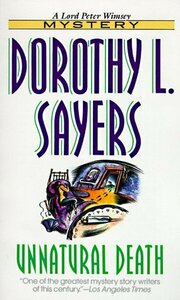Take a photo of a barcode or cover
This is one I probably won't ever re-read. Just too much a product of its time, with all the prejudice against the Other on full display.
A couple of good characters in there, and the odd bit of Wimsey wordplay that I enjoy, but once was enough.
A couple of good characters in there, and the odd bit of Wimsey wordplay that I enjoy, but once was enough.
The addition of Miss Climpson was an improvement, and I'm glad that there were a few more dimensions to this one than the previous two. I'm still distressed that Sayers doesn't let us spend a little more time with the characters, not just the murder ... I'm probably not suited to mysteries.
lighthearted
mysterious
slow-paced
Plot or Character Driven:
Plot
Strong character development:
No
Loveable characters:
Yes
Diverse cast of characters:
Yes
Flaws of characters a main focus:
No
adventurous
mysterious
medium-paced
Plot or Character Driven:
Plot
Strong character development:
No
Loveable characters:
Yes
Diverse cast of characters:
Complicated
Flaws of characters a main focus:
No
adventurous
challenging
informative
mysterious
fast-paced
Plot or Character Driven:
A mix
Strong character development:
Complicated
Loveable characters:
Yes
Diverse cast of characters:
N/A
Flaws of characters a main focus:
Complicated
My leasr favorite of hers so far. Everything is discovered through chance and coincidences. The ending can be very easily guessed right at the beginning. And no, the blatant racism doesn't help it one bit
A doctor comes to Lord Peter Wimsey for help after he is drummed out of town for expressing doubts about the cause of Miss Agatha Dawson's death. Since half the village plodded through her bedroom before she died, Lord Peter is faced with a plethora of suspects.
See my complete review here:
http://whatmeread.wordpress.com/tag/unnatural-death/
See my complete review here:
http://whatmeread.wordpress.com/tag/unnatural-death/
3.5
My feelings on this series haven’t really changed. The characters and atmosphere are really fun. And this time, the central mystery was pretty exciting.
My feelings on this series haven’t really changed. The characters and atmosphere are really fun. And this time, the central mystery was pretty exciting.
I enjoyed this, though I spotted one of the main plot points at once , mostly because of the introduction of Ms. Climpton, who was a fantastic character. Good complexity of the initial motive. As in her other books, author is appallingly bigoted when it comes to non-white-English-aristocracy-or-their-immediate-peers/servants.
Spoiler
namely that Mrs. Forrest == Ms. Whittaker
adventurous
dark
lighthearted
fast-paced
Plot or Character Driven:
Plot
Strong character development:
No
Loveable characters:
Yes
Diverse cast of characters:
No
Flaws of characters a main focus:
Yes

